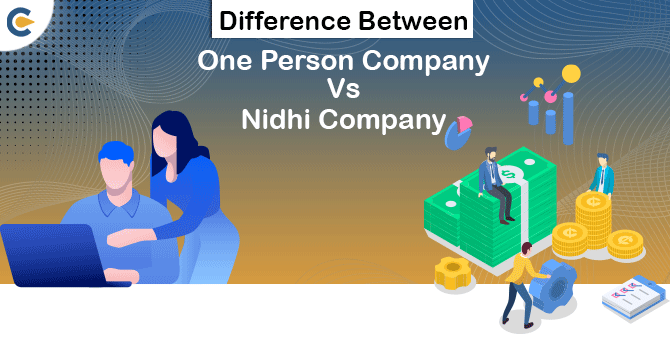To start a business is a complex task; funding or investing capital in a company is the most complicated task in India; without collateral, it is difficult to get a loan from a bank or any other financial lending body in India. Let’s differentiate One person company vs Nidhi company. The simplest form of business carried by the individual is the one-person Company, where the founder of the Company is individually liable for the Company’s debt. Still, the liability shall be limited to the extent of share capital. On the other hand, Nidhi Company is a non-banking financial firm with a corporate structure that focuses on lending and borrowing money among its members. Nidhi company is a type of NBFC that requires three directors and seven shareholders. Scroll down to check further the difference between a One person Company Vs Nidhi Company.
What do you mean by One person Company
Let’s began with the definition of One Person company to differentiate between One Person Company Vs Nidhi Company. One person company defined under section- 2(62) of the companies act 2013 One person company working as a company with only one shareholder as its member. When a company has only one founder or promoter, a One person company is founded. Because of the numerous benefits that one person provides, entrepreneurs who are just starting their enterprises prefer to form one-person companies over sole proprietorships.
Characteristics of One Person Company
In a one-person company, only one person is a member. Under the Companies Act of 2013 introduced a new dimension in the form of the Person Company. It indicates that a corporation can only have one stakeholder. Because the Companies Act of 1956 did not include the idea of OPC, a corporation like OPC lacked corporate liability. Before the 2013 act, sole proprietorship was the concept if one individual needed to create or operate their own business. Still, it is different from OPC in that it did not have access to the benefits provided by the Companies Act.
Name of the One Person Company
Section 12 of the companies act 2013 is concerned with the name of a company, whether naming a public, private, or one person. It should be mentioned whenever the Company’s name is referenced. Similarly, whether the name is printed, attached, or engraved, ‘One Person Company’ should be inscribed in brackets under the name of the Company.
Directors of the Company
Companies should have a board of directors, and in a private Limited Company, there must be at least two directors, and as far as public Limited Company is concerned, there must be at least three directors. Minimum one Director and a maximum of 15 directors are required for the OPC. The Company’s first director shall be a member as stated in the Memorandum of Agreement of the Company.
Meetings and nominee of the Company
Under section 96 of the Act mandates that annual general meetings be held within a specified time frame. However, OPCs are particularly exempt from having public meetings after each financial year. Therefore this is not a requirement. In the situation of OPC, when there is more than one Director, Section 173(5) of the Act mandates that a board meeting be held every six months of the calendar year, with a minimum space of ninety days between appointments. The decision of the general meetings is regarded as accepted or passed when it is signed by the Company’s sole member and is then transmitted to the rest of the members. The Company has a rule that allows it to continue indefinitely. During the registration of the One Person Company, the Company’s only member nominates a nominee. This is a characteristic that distinguishes OPCs from all other forms of business.
Formation of One Person Company
A single individual can form an OPC by signing the Memorandum of Association and satisfying the other requirements outlined in the Companies Act of 2013. Suppose the original member dies or becomes incapable of entering any contract. In that case, the MoA must additionally reveal all the details of a nominee who will become the Company’s sole member. In addition to the registration application, the MoA and the nominee’s consent to his nomination must be given to the Registrar of Companies. That nominee has the right to withdraw his name at any moment by making the necessary application to the Registrar. The members have the option to cancel their membership at any time.
Documents required for Registration of OPC
- The Articles of Association (AOA) establish the Company’s operating procedures.
- The memorandum of Association (MOA) these are the Company’s objectives or a business statement for which the firm will be incorporated.
- Because there is only one Director & one member, a nominee on behalf of such a person or individual must be nominated so that if he becomes incompetent or dies and cannot discharge his obligations, the nominee will act in his place. Along with his PAN card & Aadhar card, his consent in Form INC – 3 would be taken.
- Proof of the proposed Company’s registered office, proof of ownership, and a letter of authorization from the owner.
- Declaration and Consent proposed under INC-9 and DR-2
What do you mean by Nidhi Company?
Let’s understand the meaning of nidhi company by differentiating One Person Company Vs Nidhi Company. A Nidhi company is a non-banking financial firm (NBFC) with a corporate structure that focuses on lending and borrowing money among its members. Nidhi company is primarily formed to encourage members to save money for their mutual benefit. Nidhi is known to be a mutual benefit company, it is highly secure and user-friendly, and the primary source of funds is contributions from members. Nidhi company is a type of NBFC that requires three directors and seven shareholders. As per Section 406 (Companies Act, 2013), recognized Nidhi Company. It is a corporate structure governed by the Ministry of Corporate Affairs and falls under section 20A of the Companies Act of 1956.
Essential Features of Nidhi Company
Nidhi Company was established solely to encourage the practice of saving for the mutual benefit of its members. The members’ contributions are the primary source of funding for the Nidhi Company. Nidhi Company registration is quick and straightforward. It is particularly popular in India’s southern states.
The below are the features of Nidhi company:
- Nidhi company should always be a public limited company
- Lending and borrowing money is restricted to members only.
- Through the Ministry of Corporate Affairs[1], it was made legal.
- It does not require RBI permission.
- However, it is correct to raise concerns about deposit acceptance operations.
- The minimum capital necessary to incorporate a Nidhi Company is 5 lakh.
- It was founded in 2014 and is governed by Nidhi rules.
- To form the Nidhi Company, there must be at least 200 members.
- A minimum of Rs.10/- shall be paid to members of a Nidhi company that has been approved with equity shares.
Documents Required for the registration of Nidhi Company
- AOA- Article of association
- MOA- Memorandum of Association
- DIN of Directors
- Property documents /rent agreement/lease agreement
- NOC of Owner/Landlord
- PAN of the members of the Company
- Address proof of the members
- Identity proof
Conclusion
It is to be concluded that both the companies One person company and Nidhi company (One Person Company Vs Nidhi Company) are different types of companies that fall under the companies act 2013. Under the companies act 2013, the Nidhi company falls under section 406 and One person company defined under section 2 (62) of the companies operate 2013. In India, Nidhi company is popularly registered as a public limited company. A One Person Company can never be changed into a Section 8 or a Nidhi Company, according to the Companies Act of 2013. There is no resemblance between these businesses. The common feature between both the companies would be subject to the Companies Act of 2013.
Read our article:Benefits of OPC (One Person Company)











